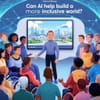ETH Zurich researcher Robert Riener argues that artificial intelligence (AI) holds great promise for improving inclusion — especially for people with disabilities. He points out that technologies such as automatic speech-recognition make television broadcasts and online lectures accessible to deaf individuals; AI-powered text generation can translate dense academic or legal content into simpler language, making knowledge more widely available. These applications can break down barriers that traditionally limited access to information, education, and public services.
Beyond communication and information, Riener highlights the potential of AI in medical care, rehabilitation, and mobility. For instance, continuous monitoring of health data may enable early detection of complications like pressure ulcers or circulatory problems in paraplegic patients. When paired with robotics and exoskeleton technologies, AI could restore mobility and independence for individuals with physical impairments — making a substantial difference in their daily lives.
However, Riener cautions that AI is not inherently inclusive or fair — much depends on how it is developed. He notes that many AI systems are trained on data drawn from relatively homogeneous populations (e.g., healthy, able-bodied, often male), which causes the technology to perform poorly or even discriminate against people with disabilities. This can lead to flawed outputs — for example, misidentification in facial recognition or misinterpretation in screening tools. When AI-generated images or texts depict disability, they often reinforce stereotypes rather than portraying the full humanity and diversity of people with disabilities.
To avoid these pitfalls, Riener argues for inclusive design and development practices: people with disabilities must be involved not only as end-users, but as active contributors, designers, testers, and researchers. AI systems need diverse and representative training data, transparent algorithms, and thorough auditing for bias. Only by embedding inclusion from the start — and valuing fairness as highly as efficiency — can AI fulfill its potential to become a tool for emancipation, accessibility, and broader social participation.


